| | Charlie Kirk’s killing raises fears of political violence, top US and Chinese officials hold a rare ͏ ͏ ͏ ͏ ͏ ͏ |
| |  | Flagship |  |
| |
|
The World Today | 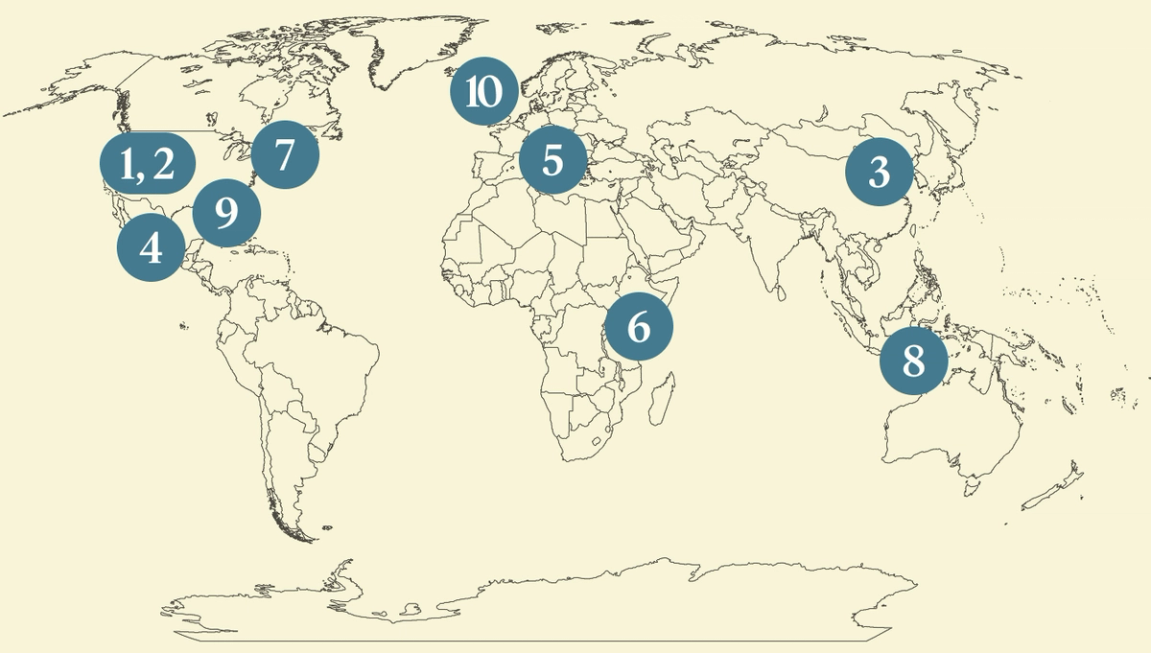 - Kirk killing ‘dark moment’
- Political violence fears
- US-China diplomacy
- Mexico blocks Chinese cars
- US to press Europe on LNG
- Africa’s debt challenge
- Trump’s Epstein lawsuit
- Deadly Asian floods
- Quiet US storm season
- Britain’s safe roads
 The rise of beta blockers for anxiety, and a Chicago exhibition examines the age after the dinosaurs. |
|
Kirk killing is ‘dark moment’ |
 Cheney Orr/File Photo/Reuters Cheney Orr/File Photo/ReutersUS President Donald Trump called the murder of right-wing activist Charlie Kirk a “dark moment for America,” ordering flags lowered to half-mast in his honor. Kirk — a longtime Trump ally, fundraiser, and friend — was shot while giving a talk in Utah. The killer is still at large: Two men were held in the immediate aftermath, but both were released. Kirk was a “transformative figure whose legacy will shape the Republican Party’s future,” Semafor’s Principals team noted, while The Atlantic’s George Packer wrote: “His murder is a tragedy for his family and a disaster for the country. In an atmosphere of national paranoia and hatred, each act of political violence makes the next one more likely.” |
|
Political violence fears grow |
 Daniel Becerril/Reuters Daniel Becerril/ReutersThe killing of conservative activist Charlie Kirk points to the seemingly worsening scourge of political violence in the United States, global media said. News outlets warned of a vicious spiral, connecting Kirk’s killing to last year’s attempted assassination of US President Donald Trump, and myriad other attacks. “It’s a sad routine in today’s America: a political figure dies or is attacked, and good wishes follow, seeking to revise the rules of public discourse, with the same effect as those condolence messages,” El País wrote. Die Zeit warned of “escalation and powerlessness,” while The Australian characterized Kirk’s death as “another symbol of a broken and deeply flawed culture that too often stains America’s accomplishments.” |
|
 Brian Snyder/Reuters Brian Snyder/ReutersThe US and China’s top defense and foreign officials held rare telephone conversations, suggesting a meeting between the superpowers’ leaders may be imminent. The sudden flurry of diplomacy came despite lingering tensions over trade and security between the world’s two largest economies. Washington and Beijing have imposed tariffs on one another and US President Donald Trump complained last month of a huge military parade hosted by Chinese leader Xi Jinping attended by other autocrats. The duality of the US approach — courting China even as it targets it — mimics Washington’s strategy with New Delhi: Trump yesterday called India’s leader a “very good friend,” even as he maintains hefty tariffs on the country for purchasing Russian oil. |
|
Mexico curbs Chinese imports |
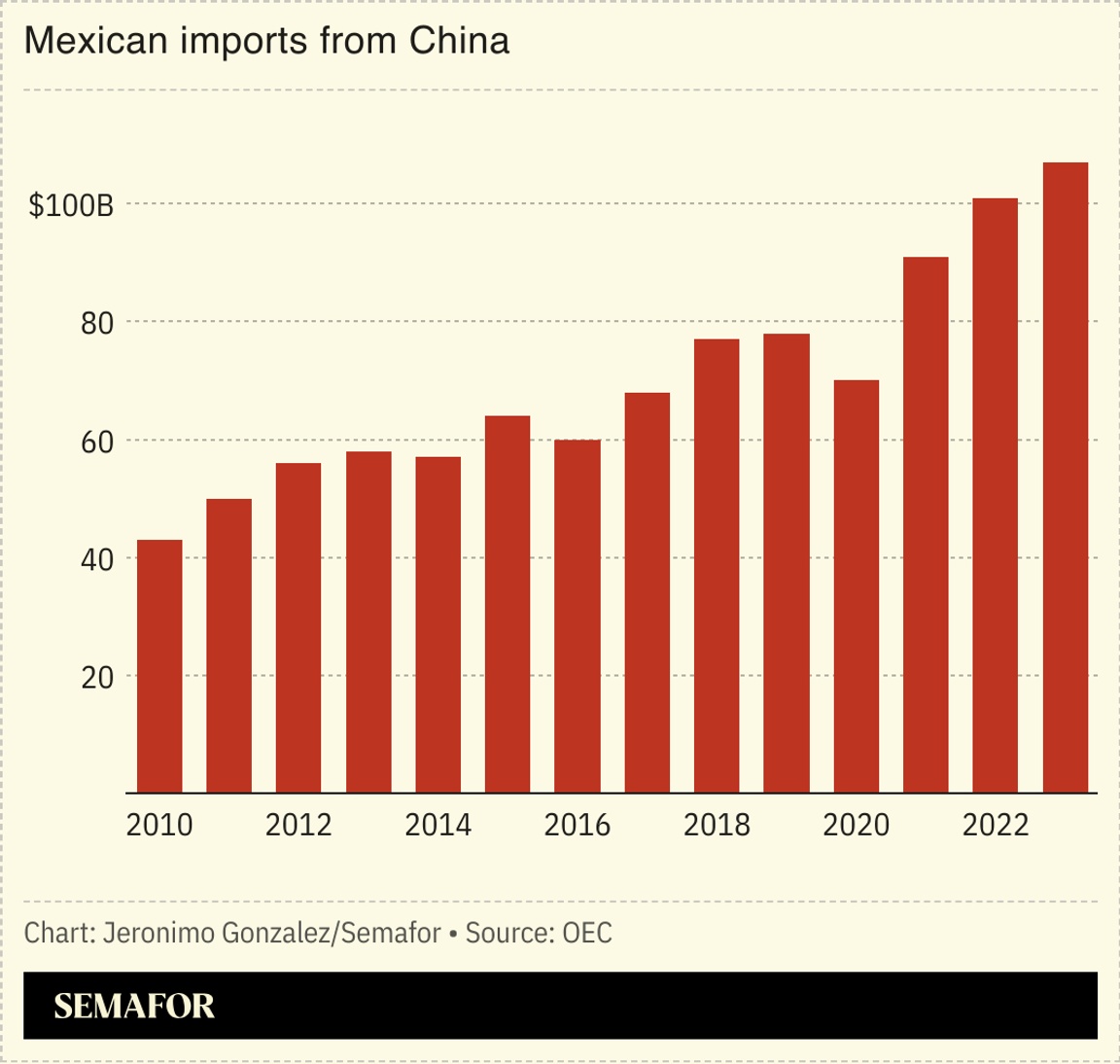 Mexico said it would slap a 50% tariff on Chinese car imports, acquiescing to US pressure. Mexico is the number one export destination for Chinese autos, and the new rules will apply to a total of 1,400 product categories, not just cars. The move comes as US President Donald Trump presses Mexico to curb Chinese imports, some of which Washington argues are diverted northward. Mexican foreign and domestic policy is increasingly geared at assuaging Trump, who has threatened tariffs if the country fails to crack down on cartels and corruption, putting Mexican President Claudia Sheinbaum in a bind: “She is stuck between the rock of Trump’s pressures, and the hard place of Mexican narco-politics,” a Mexican analyst said. |
|
US to press Europe on LNG |
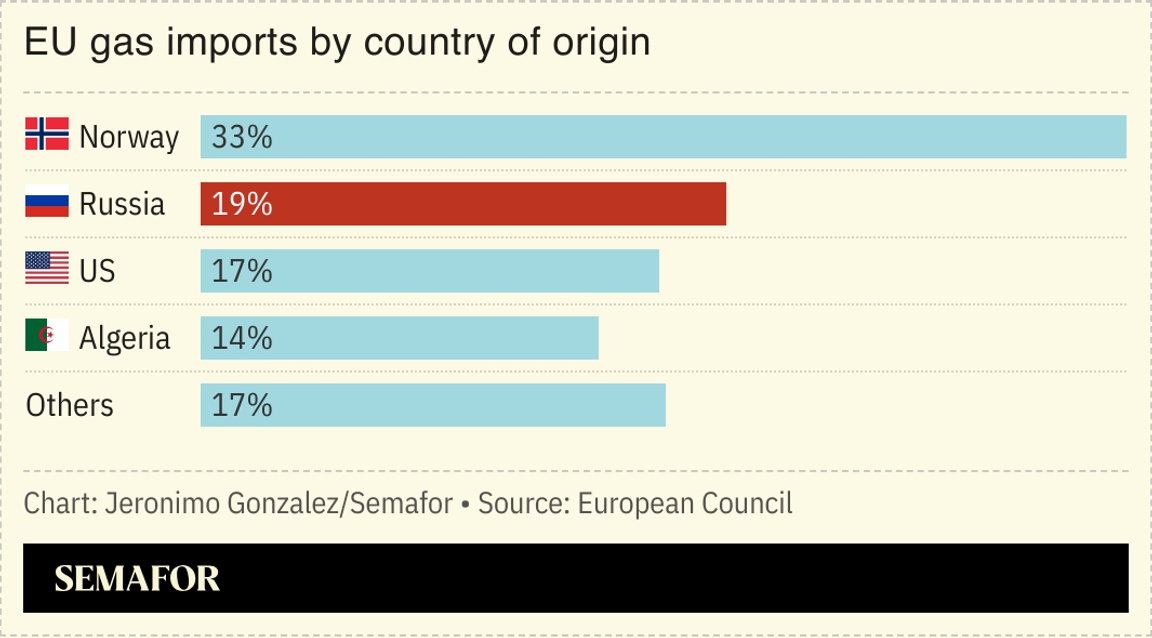 The US energy secretary will warn EU leaders today that the bloc’s climate rules are putting the continent’s energy security at risk, as Washington presses European nations to buy more gas from across the Atlantic or else face new tariffs. Though US gas producers are eager to sell to Europe, they have complained about regulations targeting methane emissions and ESG-related hurdles. “Europe’s embrace of a climate agenda and a march to net zero was wrong,” Chris Wright said ahead of talks in Brussels. Europe has so far made little progress on a pledge to buy $750 billion in US energy products: The target is likely unattainable, but Brussels needs to show momentum, or risk more tariffs, Semafor’s climate & energy editor. |
|
Africa’s looming financial challenge |
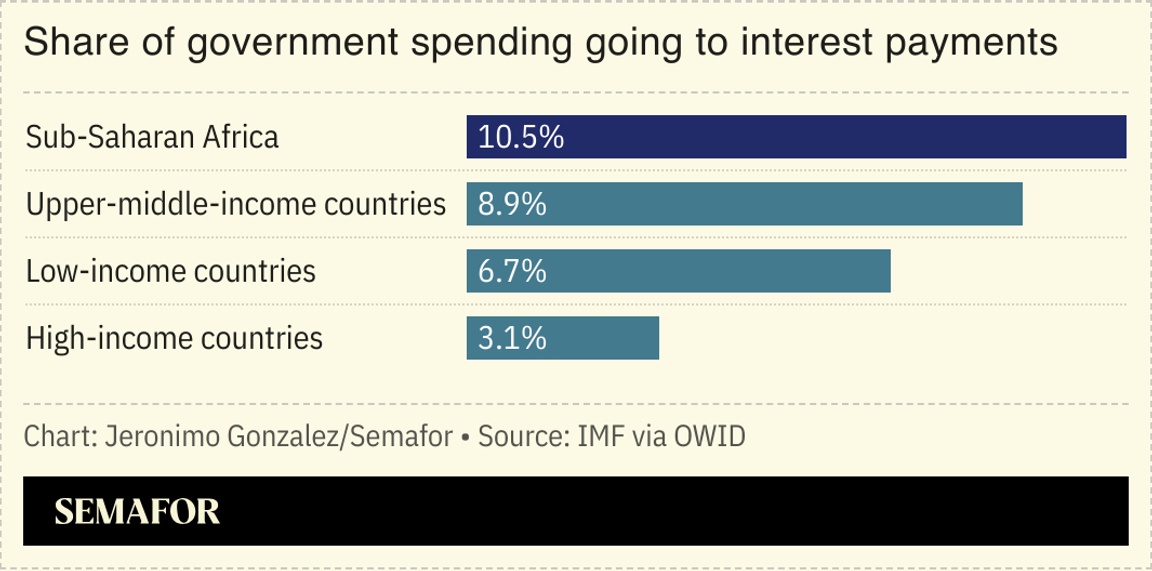 Africa’s soaring debt could lead to a financial meltdown, threatening a worrying setback on the world’s fastest-growing continent, a prominent expert argued. The former head of Kenya’s central bank Patrick Njoroge said Africa faced a series of challenges: Onerous interest rates mean many countries spend more on their debt than on health or education. At the same time, export-oriented economies are facing the brunt of Washington’s tariffs while foreign aid cuts force many to boost welfare spending. The headwinds could fuel further social unrest, as the continent fails to create enough jobs. While “there are no quick fixes,” Njoroge said, there is “urgent need” for debt relief to arrest the downward spiral many countries are facing. |
|
Trump threatens Epstein lawsuit |
 David Swanson/Reuters David Swanson/ReutersUS President Donald Trump threatened to sue The New York Times over its reporting on his links to disgraced financier and sex offender Jeffrey Epstein. A congressional committee this week received from Epstein’s estate a collection of letters and photographs allegedly sent to him for his 50th birthday. The documents included a message from former President Bill Clinton and a note, purportedly from Trump, written inside a sketch of a naked woman. Trump is already suing The Wall Street Journal and its owner Rupert Murdoch for its reporting on the Epstein files. The scandal is resonating beyond the US, too: Britain today withdrew its ambassador to Washington over his alleged links to Epstein. |
|
Floods hammer Asian nations |
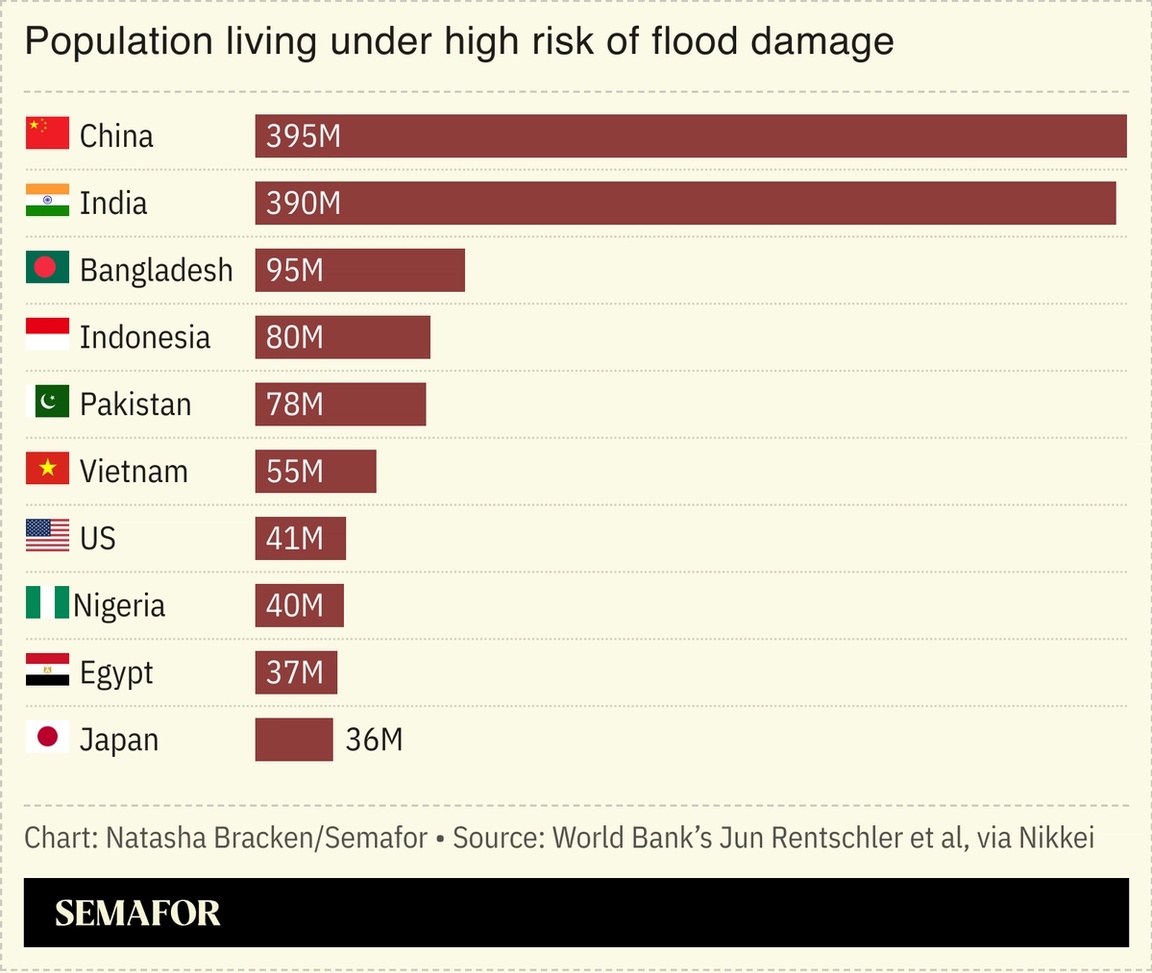 Deadly floods in Asia have devastated crops, crippling already fragile food production. Heavy rainfall in Indonesia led to a river overflowing; at least 13 people have died in Bali and Nusa Tenggara. Meanwhile, flash floods in Pakistan’s Punjab province have destroyed thousands of acres of farmland, wiping out about 60% of crops and 30% of its sugar cane; cotton production is also expected to fall by 35%. The province accounts for over two thirds of the country’s food grain production, Bloomberg reported, and Pakistan is already struggling economically after months of heavy rain that killed more than 850 people, displaced 2 million, and damaged infrastructure. “A major economic upheaval is already emerging,” a spokesperson said, “along with a humanitarian crisis.” |
|
Unusually quiet hurricane season |
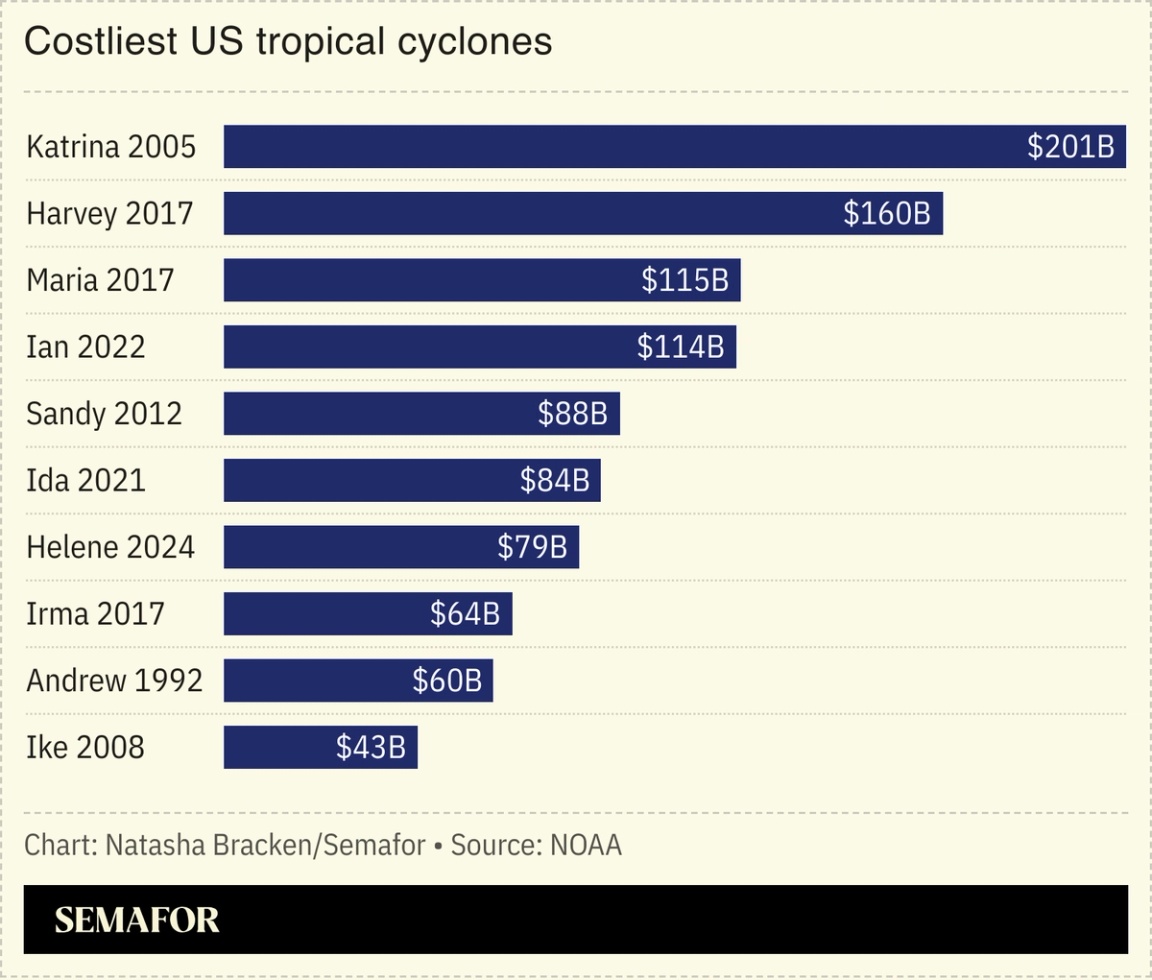 The peak of the US hurricane season has been unexpectedly quiet, with no tropical storms for nearly two weeks. Sept. 10 is the historical high point of hurricane activity in the Atlantic, but since Storm Fernand dissipated in August there have been no major cyclones. A meteorologist told Scientific American that it was the first hurricane-free Sept. 10 since 2016. Storms gain energy from warmer surface waters, so climate change is expected to bring more frequent and stronger hurricanes, but a clear signal of such an increase is yet to be seen. Scientists warned the season is only half over, and autumn often sees major hurricane activity. |
|
|